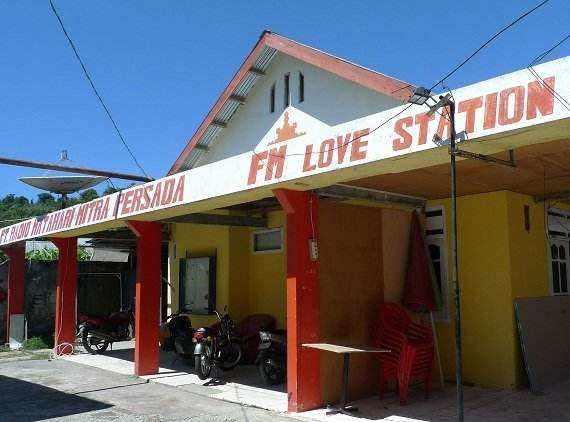CERITA
From Radio Hamas to Radio for peace: the transformation of a Poso station
"It’s a dramatic change from the radio station he use to run at the height of the inter-religious conflict in Poso. "
Gungun Gunawan

“I named this radio station Matahari or sun because I want it to shine light on discrimination,” explains manager Rafiq Shamsuddin
It’s a dramatic change from the radio station he use to run at the height of the inter-religious conflict in Poso.
“Before Matahari Radio, I established Hamas Radio. It was a battle attack radio station and was the voice for the Muslim fighters. The only songs we broadcast were Muslims songs, nothing else,” he said.
Poso in east Indonesia has been the scene of brutal skirmishes between Christians and Muslims. The town of Poso has acquired an unenviable reputation for some of the region's worst inter-religious violence.
The peak of the fighting was from 1998 to 2002. Almost 600 people were killed and nearly 10,000 others displaced.
Rafiq Shamsuddin helped fuel the hatred on the airwaves through his Radio Hamas. He was jailed for six months. It was during his time behind bars that he had time to think.
“I never killed anyone with my own hands but I started to realize that my radio station could hurt people and indirectly kill people. I started to deeply regret what I had done and had a heaviness in my heart. I didn’t feel like 6 months in jail was enough of a punishment so when I was released I decided I had to do something to release the burden. So this is part of my attempt at redemption. We closed the old radio station and established the Matahari Radio. We invite both Muslim and Christian leaders into the studio to talk on many topics like Poso’s future and how we make sure that it is safe and peaceful. Slowly but surely the city is recovering,” he said.
At first he says Christian groups were suspicious and didn’t believe that he had changed.
They also faced financial problems.
“No one wanted to buy advertising time on the radio station because the situation was still unstable. But thanks be to God my broadcasted agreed to work for free. They enjoyed being on air. I raised enough to cover operation costs and pay for the electricity,” he said.
The way he paid for it was from profits from his karaoke bar, café and billiard hall.
He says it took two years for the station to be accepted by the community and things got easier in 2009.
“There radio has one golden rule. Our duty is distribute truth information and sometimes counter rumors that come from unclear sources. We have to be very careful about how we report things in Poso. It’s very easy to trigger violence here. For example if a Muslim died in the city of Tentena maybe in a traffic accident or some other way people immediately start thinking were they killed by Christians? And a few hours later there might be a revenge attack. So we sometimes break journalism ethnics and package the death as a accident even if we are not sure yet. We have done that several times.”
The radio now streams online and the future of Radio Matahari looks bright.
- eng
- deradicalisation
- gungun gunawan
- Radio Matahari Poso
- Poso religious conflict
- DRL
Komentar (0)
KBR percaya pembaca situs ini adalah orang-orang yang cerdas dan terpelajar. Karena itu mari kita gunakan kata-kata yang santun di dalam kolom komentar ini. Kalimat yang sopan, menjauhi prasangka SARA (suku, agama, ras dan antargolongan), pasti akan lebih didengar. Yuk, kita praktikkan!